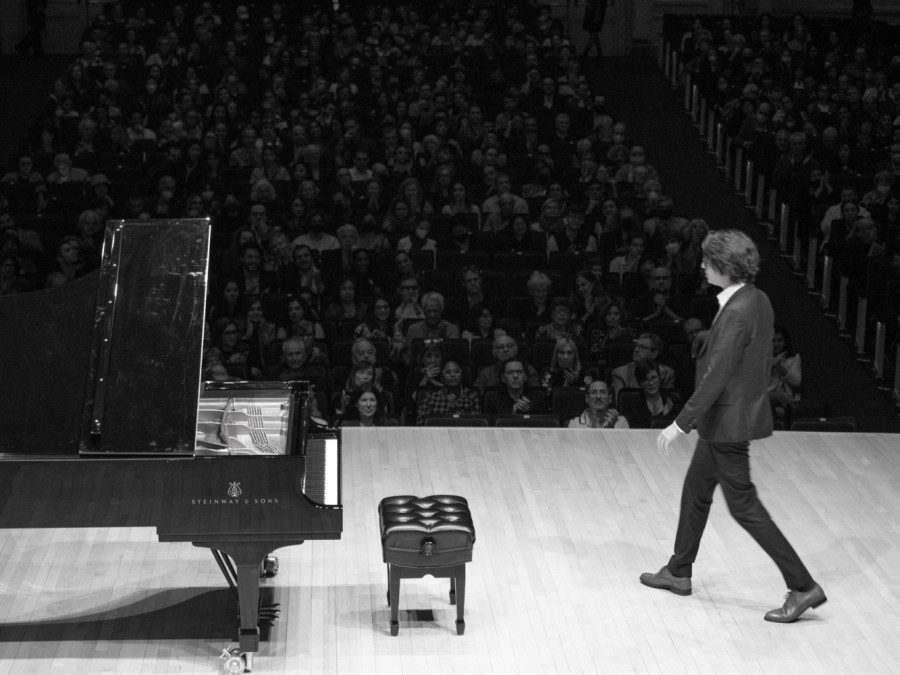Lucas Debargue: The future of classical music
French pianist and composer Lucas Debargue infused classic composition with his own emotive interpretation during his Carnegie Hall solo debut.
French pianist and composer Lucas Debargue made his debut at Carnegie Hall on Nov. 6. (Courtesy photo by Pavel Antonov)
November 18, 2022
Carnegie Hall has never felt more intimate than it did when graced by Lucas Debargue. On the evening of Nov. 6, seasoned Carnegie Hall concertgoers, classical music enthusiasts and I all gazed upon center stage, observing a man perched delicately on the edge of a grand piano stool.
Debargue only began to play professionally at age 20, but was endowed with a creative ear that carried him far beyond his constituents. Four years later, he placed fourth in the renowned International Tchaikovsky Competition, where his technical boundlessness and fervent self-expression won the hearts of piano aficionados across the world.
In his one-night Carnegie Hall debut, Debargue kept his eyes looking straight forward and hands quietly in his lap, in preparation for the storm he would soon command. He stayed still while stragglers took their seats under the barely dimmed house lights — our attention was on his playing.
Debargue introduced his sound and style through the gentle beginnings of Scarlatti’s sonatas. His layered melodic contrasts quickly convinced the audience not only of his creative — but also technical prowess. Each note melded unexpectedly into the next. Ever so visceral, you could feel Debargue’s passion bubbling up inside of you as he turned trills from embellishing reverberance to goosebumps along your neck.
Debargue’s oscillating performance seemed to reflect his mood’s ebb and flow. But this was his magnetism, his unequaled appeal. With a hunched back and a flick of his wrists, Debargue exemplified the resounding simplicity of a solo pianist.
Easing into his second piece, “Gaspard de la nuit,” Debargue had the audience at the tips of his fingers. He tampered with the piece’s moments of pause, capturing his own eccentricity in Ravel’s harmonic textures. Notes danced between being rhapsodic and gentle, as one hand kept up the pulse of the melody and the other rang out a cascade of dissonant notes. The audience was fully entangled in Debargue’s web, enraptured in his hypnotic vitality until the coda, where he loosened his grip and suddenly released us into the intermission.
The house was abuzz as we attempted to articulate our Debargue experience. I looked around to see bowtie and tweed-clad 12-year-olds agreeing to disagree with Russian babushkas on which sonata they found most evocative. Contemporaries cooed over his ability to find freedom in the rules of classical music mantra, even bending a few; some might say this was in compensation for his informal training, but to others, it demonstrated a mere emphasis on artistic choice. His interpretative voice crosses generational bounds with its captivation.
In the second act, Debargue dove right into Chopin’s “Ballade No. 2.” By then, it was clear that the audience had disappeared for Debargue. He was fully immersed in his own world, with his eyes closed and head slightly tilted back, as his fingers effortlessly moved off of pure instinct. His moments of subtlety and restraint resonated louder than those of dramatic modulation. Throughout “Polonaise-fantaisie” and his soaring finale, we were lulled in and out of a mesmerizing, cacophonic haze. Finishing with “Après une lecture du Dante,” Debargue took a breath of relief alongside the rest of us, having seemed to blow himself away.
At the end of his program, Debargue asked the audience if he could now play one of his compositions. After shifting to his own work after hearing interpretations of his classical influences, a lighter and more playful tone became evident, less bogged down by historic implications. Tumultuous and thrilling, all the while technically ravaging, Debargue let out a resounding final note. He threw his body back and jumped off of his bench and out of his storm, flying into the arms of unceasing applause.
Debargue did not approach his Carnegie Hall debut carefully. He came in full force, not merely showcasing his ability to play a piece, but his ability to enter one. In the end, his take was unconventional and delineating. But it was this stubborn originality that got him here.
Debargue used each piece as a vessel to carry his own perspective of self-expression. As an audience, we had no choice but to follow him into his obsession. His desperate need to play fostered our even more desperate need to listen.
Contact Zoe Singh at [email protected].


























































































































































